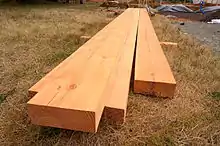lauta
Elfdalian
Etymology
Inherited from Old Norse lúta, from Proto-Germanic *lūtaną, from Proto-Indo-European *lewd- (“to duck, crouch, feign, cringe, become small”).
Verb
lauta (present laut, plural lautum, preterite lot or låt or lut, supine lutið, past participle lutin)
- (neuter verb) lean
Conjugation
Derived terms
- lautänd
Finnish
Etymology
From Proto-Finnic *lauta (compare Estonian laud (“table”)), most likely borrowed from Proto-Baltic [Term?] (compare Lithuanian plautas (“shelf”)), or alternatively from Proto-Germanic *flauþī (compare Norwegian flauta (“crossbeam in sleigh”)). The word has also been borrowed into Samic (compare Skolt Sami luʹvdd (“plank; float for seine”)).
Pronunciation
- IPA(key): /ˈlɑu̯tɑ/, [ˈlɑu̯t̪ɑ]
- Rhymes: -ɑutɑ
- Syllabification(key): lau‧ta
Noun
lauta
- board (long, wide and thin piece of sawn timber)
- board (long, wide and thin platform; the English translation is often board, but not necessarily always the other way around)
- šakkilauta ― chessboard
- silityslauta ― ironing board
- lainelauta ― surfboard
- lumilauta ― snowboard
- ponnahduslauta ― springboard
- (colloquial, possibly derogatory) ironing board (a woman who has small breasts)
Usage notes
Declension
| Inflection of lauta (Kotus type 9*F/kala, t-d gradation) | ||||
|---|---|---|---|---|
| nominative | lauta | laudat | ||
| genitive | laudan | lautojen | ||
| partitive | lautaa | lautoja | ||
| illative | lautaan | lautoihin | ||
| singular | plural | |||
| nominative | lauta | laudat | ||
| accusative | nom. | lauta | laudat | |
| gen. | laudan | |||
| genitive | laudan | lautojen lautainrare | ||
| partitive | lautaa | lautoja | ||
| inessive | laudassa | laudoissa | ||
| elative | laudasta | laudoista | ||
| illative | lautaan | lautoihin | ||
| adessive | laudalla | laudoilla | ||
| ablative | laudalta | laudoilta | ||
| allative | laudalle | laudoille | ||
| essive | lautana | lautoina | ||
| translative | laudaksi | laudoiksi | ||
| instructive | — | laudoin | ||
| abessive | laudatta | laudoitta | ||
| comitative | See the possessive forms below. | |||
| Possessive forms of lauta (type kala) | ||||||||||||||||||||||||||||||||||||||||||||||||||||||||||||||||||||||||||||||||||||||||||||||||||||||||||||||||||||||||||||||||||||||||||||||||||||||||||||||||||||||||||||||||||||||||||||||||||||||||||||||||||||||||||||||||||||||||||||||||||||||||||||||||||||||||||||||||||||||||||||||||||||||||||||||||||||||||||||||||||||||||||||||||||||||||||||||
|---|---|---|---|---|---|---|---|---|---|---|---|---|---|---|---|---|---|---|---|---|---|---|---|---|---|---|---|---|---|---|---|---|---|---|---|---|---|---|---|---|---|---|---|---|---|---|---|---|---|---|---|---|---|---|---|---|---|---|---|---|---|---|---|---|---|---|---|---|---|---|---|---|---|---|---|---|---|---|---|---|---|---|---|---|---|---|---|---|---|---|---|---|---|---|---|---|---|---|---|---|---|---|---|---|---|---|---|---|---|---|---|---|---|---|---|---|---|---|---|---|---|---|---|---|---|---|---|---|---|---|---|---|---|---|---|---|---|---|---|---|---|---|---|---|---|---|---|---|---|---|---|---|---|---|---|---|---|---|---|---|---|---|---|---|---|---|---|---|---|---|---|---|---|---|---|---|---|---|---|---|---|---|---|---|---|---|---|---|---|---|---|---|---|---|---|---|---|---|---|---|---|---|---|---|---|---|---|---|---|---|---|---|---|---|---|---|---|---|---|---|---|---|---|---|---|---|---|---|---|---|---|---|---|---|---|---|---|---|---|---|---|---|---|---|---|---|---|---|---|---|---|---|---|---|---|---|---|---|---|---|---|---|---|---|---|---|---|---|---|---|---|---|---|---|---|---|---|---|---|---|---|---|---|---|---|---|---|---|---|---|---|---|---|---|---|---|---|---|---|---|---|---|---|---|---|---|---|---|---|---|---|---|---|---|---|---|---|---|---|---|---|---|---|---|---|---|---|---|---|---|---|---|---|---|---|---|---|---|---|---|---|---|---|---|---|---|---|---|---|---|
| ||||||||||||||||||||||||||||||||||||||||||||||||||||||||||||||||||||||||||||||||||||||||||||||||||||||||||||||||||||||||||||||||||||||||||||||||||||||||||||||||||||||||||||||||||||||||||||||||||||||||||||||||||||||||||||||||||||||||||||||||||||||||||||||||||||||||||||||||||||||||||||||||||||||||||||||||||||||||||||||||||||||||||||||||||||||||||||||
See also
Ingrian


Etymology
From Proto-Finnic *lauta. Cognates include Finnish lauta and Estonian laud.
The sense "table" is a semantic loan from a Southern Finnic language, either Estonian laud or Votic lautõ.
Pronunciation
- (Ala-Laukaa) IPA(key): /ˈlɑu̯tɑ/, [ˈɫɑu̯d]
- (Soikkola) IPA(key): /ˈlɑu̯tɑ/, [ˈɫɑu̯d̥ɑ]
- Rhymes: -ɑu̯t, -ɑu̯tɑ
- Hyphenation: lau‧ta
Noun
lauta
Declension
| Declension of lauta (type 3/kana, aut-avv gradation) | ||
|---|---|---|
| singular | plural | |
| nominative | lauta | lavvat |
| genitive | lavvan | lautoin |
| partitive | lautaa | lautoja |
| illative | lautaa | lautoi |
| inessive | lavvaas | lavvois |
| elative | lavvast | lavvoist |
| allative | lavvalle | lavvoille |
| adessive | lavvaal | lavvoil |
| ablative | lavvalt | lavvoilt |
| translative | lavvaks | lavvoiks |
| essive | lautanna, lautaan | lautoinna, lautoin |
| exessive1) | lautant | lautoint |
| 1) obsolete *) the accusative corresponds with either the genitive (sg) or nominative (pl) **) the comitative is formed by adding the suffix -ka? or -kä? to the genitive. | ||
Synonyms
- (table): kans
Derived terms
References
- Ruben E. Nirvi (1971) Inkeroismurteiden Sanakirja, Helsinki: Suomalais-Ugrilainen Seura, page 252
Italian
Latin
Participle
lauta
- inflection of lautus:
- nominative/vocative feminine singular
- nominative/accusative/nominative neuter plural
Serbo-Croatian
Pronunciation
- IPA(key): /lǎuta/
- Hyphenation: la‧u‧ta